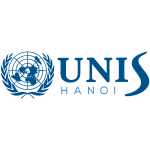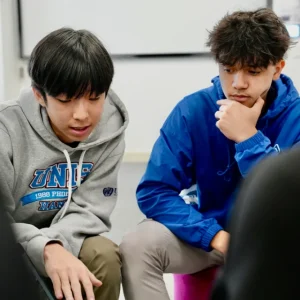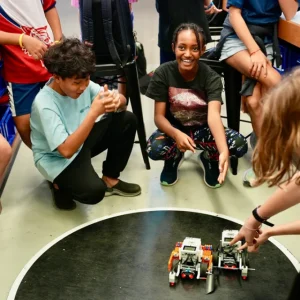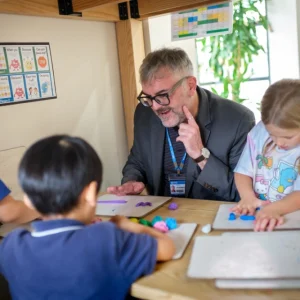In an increasingly interconnected world, digital literacy skills have become essential for personal, academic, and professional success. These skills enable students to navigate the digital landscape effectively, ensuring they can communicate, research, and engage with digital tools responsibly and informally.
The ability to critically assess online information, adapt to evolving technologies, and collaborate through digital platforms is no longer optional but necessary. This article explores the definition of digital literacy skills, their significance, and the methods for improving them for students.
What are Digital Literacy Skills?
Digital literacy skills are a broad range of competencies that enable students to interact with digital technologies effectively and responsibly. These skills encompass more than just technical proficiency; they also involve critical thinking, ethical considerations, and the ability to communicate effectively in digital environments.

Digital literacy consists of several key pillars: staying up to date with emerging technologies, communicating effectively online, managing digital content, and leveraging digital tools for collaboration. It extends beyond mere technological interaction to include problem-solving, analytical thinking, and the ability to evaluate digital content critically.

Some examples of digital literacy skills for students include:
- Using a smartphone or computer to check emails
- Conducting online research using search engines
- Evaluating the credibility of digital sources
- Creating and managing social media profiles
- Understanding and applying cybersecurity practices
- Engaging with digital financial tools such as online banking
Why is Digital Literacy Important?
Digital literacy skills empower students to fully engage with digital resources, ensuring they can make informed decisions, safeguard their privacy, and contribute positively to the digital world. Understanding the impact of technology on education further emphasises the role digital fluency plays in shaping how students learn, think, and collaborate.

Here are 4 reasons why digital literacy skills are beneficial:
- Encourages Individual Learning: Digital literacy fosters independent problem-solving and adaptability, essential skills for lifelong learning. The ability to research and navigate new technologies ensures students can continuously update their knowledge.
- Enhances Memory and Knowledge Retention: Digital learning tools provide varied and dynamic ways of acquiring knowledge, reinforcing understanding through multimedia formats such as videos, simulations, and interactive exercises.
- Encourages Communication and Teamwork: Digital literacy enables students to collaborate effectively in virtual spaces, fostering teamwork and cross-cultural interactions. These skills allow students to engage in meaningful discussions and collaborate with diverse teams in professional and academic settings.
- Supports Flexible Teaching Strategies: Digital literacy allows adaptive teaching methods catering to diverse learning needs. Technology-enabled education ensures students can access personalised educational content suited to their unique learning styles and paces.
5 Key Digital Literacy Skills
Here are 5 key digital literacy skills for students in the modern world.
Technical Skills
They include the ability to operate computers, use word processing software, manage digital files, create presentations, and navigate the internet effectively. Mastering these skills ensures students confidently engage with digital tools in academic and professional environments.

In addition, technical skills encompass knowledge of operating systems, basic coding principles, and the ability to troubleshoot common technological issues.
Independent Research
Independent research involves using search engines, online databases, and academic sources to gather credible information. It also includes evaluating the accuracy and relevance of digital content to make well-informed decisions.

They empower students to become self-sufficient learners, enabling them to access and analyse digital materials for academic, professional, and personal growth.
Media Literacy
Students with strong media literacy skills can discern credible sources, identify bias, and interpret digital messages effectively. In an era of digital media saturation, media literacy helps students navigate vast amounts of content, differentiating between factual information and misleading narratives.

Additionally, media literacy promotes ethical engagement with digital content, encouraging responsible sharing and constructive online discussions.
Digital Citizenship
Digital citizenship encompasses understanding digital rights, respecting intellectual property, practising online safety, and maintaining a positive digital presence. By fostering digital citizenship, students contribute to a respectful and inclusive online community.

Also, this skill includes understanding the impact of online actions, protecting personal data, recognising cyber threats, and promoting positive digital interactions. Digital citizens are aware of their online footprints and strive to create a safe and constructive digital environment for themselves and others.
Communication and Collaboration
Effective communication involves using digital tools such as email, social media, and virtual meeting platforms to share information and engage in discussions.

Strong communication skills allow students to engage in meaningful discussions, express ideas clearly, and collaborate efficiently in virtual settings, which is increasingly essential in remote work and online learning environments.
How to Improve Digital Literacy Skills for Students
Developing digital literacy requires a strategic approach in educational settings.

Here are some key strategies:
- Collaborate with Colleagues: Teachers and educators should collaborate to integrate digital tools into the curriculum effectively, sharing best practices and strategies for enhancing digital literacy.
- Focus on the Curriculum: Digital literacy should be embedded into lesson plans to ensure students gain essential skills, incorporating digital research and communication tools into standard learning activities.
- Make Lessons Digital: Incorporating digital platforms and interactive resources enhances student engagement and learning, using multimedia elements to reinforce understanding.
- Create Modern Classrooms: A technology-equipped learning environment fosters digital competence among students, ensuring they have access to the tools necessary for digital engagement.
- Engage Students and Teachers: Encouraging active participation in digital activities ensures continuous skill development, fostering a culture of digital exploration and responsible usage.
At UNIS Hanoi, we recognise the importance of equipping students with digital literacy skills essential for academic success and future careers. Through engaging learning activities, we nurture students’ curiosity, encourage independent research, and promote ethical digital citizenship.

Our students develop critical thinking abilities by analysing digital information and engaging with global issues. We nurture inquiring minds, ensuring they can navigate digital environments with confidence and responsibility. Integrating digital literacy into our curriculum prepares students to be knowledgeable thinkers and active contributors to the digital world.
Join UNIS Hanoi to Lead in a Digitally Connected World
Mastering digital literacy skills can help student succeed in academic performance and future endevours. At UNIS Hanoi, we are committed to providing students with the tools they need to thrive in a technologically advanced society.

Our dedicated admissions team is here to guide families through the application process. The online application for the 2025-2026 academic year is now open. For those interested in available seats for the current semester, we invite you to contact our admissions team at admissions@unishanoi.org for personalised assistance. Join us and empower your child with the digital skills needed for the future!
Author Profile

- UNIS Hanoi is ever-evolving, but one thing that remains is our passion to nurture and equip students to be agents of change for a better world.
Latest entries
 Calendar, News and Publications1 Oct 2025Student Voice and Choice: Benefits & 6 Best Practices
Calendar, News and Publications1 Oct 2025Student Voice and Choice: Benefits & 6 Best Practices Calendar, News and Publications22 Sep 2025Stress Management Techniques for Students: 8 Proven Methods
Calendar, News and Publications22 Sep 2025Stress Management Techniques for Students: 8 Proven Methods Calendar, News and Publications21 Sep 2025What is an Inclusive Learning Environment? A Parent’s Guide
Calendar, News and Publications21 Sep 2025What is an Inclusive Learning Environment? A Parent’s Guide Calendar, News and Publications21 Sep 20258 Game-Changing Innovative Teaching Strategies
Calendar, News and Publications21 Sep 20258 Game-Changing Innovative Teaching Strategies